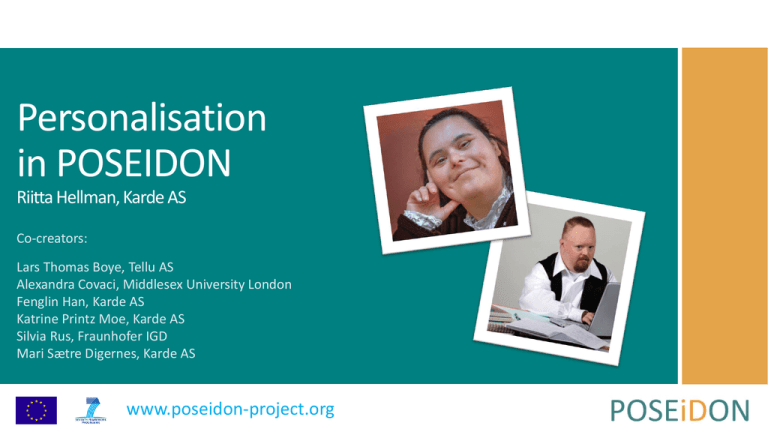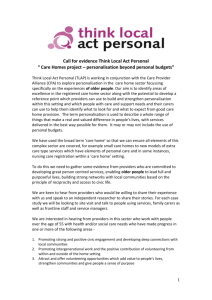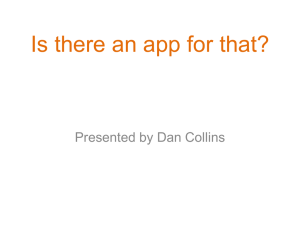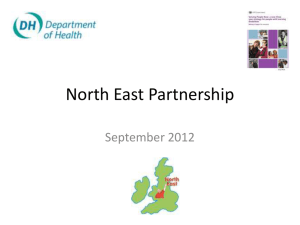Personalisation in POSEIDON
advertisement

Personalisation in POSEIDON Riitta Hellman, Karde AS Co-creators: Lars Thomas Boye, Tellu AS Alexandra Covaci, Middlesex University London Fenglin Han, Karde AS Katrine Printz Moe, Karde AS Silvia Rus, Fraunhofer IGD Mari Sætre Digernes, Karde AS www.poseidon-project.org PersOnalized Smart Environments to increase Inclusion of people with DOwn's syNdrome POSEIDON project EU FP7 Objective 'ICT for smart and personalised inclusion' • • • • • 2013 – 2016 Budget 4 million € Contribution EU 3 million € Karde is project coordinator Participating countries: Norway, Germany, UK, Sweden Main goal of POSEIDON: POSEIDON goals Increased quality of life, independence and inclusion of persons with Down syndrome • Develop smart solutions to support daily living • Available on different devices • Personalisation for each person, based on simple and clean HCI • Context awareness for situation and environments Cognitive disabilities: Number of people in Europe • Visual learning style – visual processing and visual memory skills are strengths. Typical learning characteristics of children with Down syndrome (a) • Reading is usually a relative strength, compared to oral language. • Numbers can be an area of difficulty, focus should be on functional maths that is useful for everyday living. • Social understanding and non-verbal communication are strengths. • Reduced muscle tone causes difficulties in movement control (both fine and gross motor skills can be delayed). • Around 50 % of children with Down’s syndrome have some form of hearing impairment Typical learning characteristics of children with Down syndrome (b) • About 70 % of children with Down syndrome need to wear glasses by the time they start school. Even with corrective prescription individuals with Down’s syndrome have difficulty focuses ‘at near’. • Specific speech and language profile – receptive language is usually superior to expressive language. • Auditory short-term memory and auditory processing is an area of weakness. • Auditory memory difficulties should be compensated for by the use of visual supports and prompts wherever possible (signs, pictures, words). How do we work? Workshops and technology experiments together with people with Down syndrome • Persons with DS in our sample can do only a few things completely on their own, but they also show that many things can be done with differing degrees of help. Findings from requirements specification questionnaires (a) • A majority of people with DS in our sample uses modern ICT (laptop/PC [81,9 %], tablets [85 %], and smartphones [56,4 %]. • About half of them need help when using these devices. • Modern assistive technology (as e-learning) is regarded as helpful. • Social integration varies highly between work/school and leisure time. Carers say that 38,4 % are well integrated at school or work but only 23,0 % in leisure time. Findings from requirements specification questionnaires (b) • For all daily activities, a support for independence and autonomy could be helpful. Most important seems to be supporting communicating and socialising. • Carers see also chances to make their own work easier. They hope to get better informed about the whereabouts of their protégés (e.g., whether they have reached a destination safely), or setting alerts to remind them of doing certain things. How do we work? Pre pilot in Mainz: Navigation to Gutemberg museum • The prototype was meant as a starting point for discussions and idea generation. • We were looking for inputs for the design of the POSEIDON navigation app. • Calendar app with multimedia instructions • Personalisable navigation app What did we make? POSEIDON applications for end users • Money handling game on the interactive table • Money handling app • Healthy food app (under construction) • Home navigation system • Context awareness module • POSEIDON web for carers • Social platform This app supports daily planning, traveling, shopping and personal video clips: Main view of the primary end user’s app • Routes – Start navigation by using planned routes or a new route. • Map – View current position on Google Maps. • Calendar – View planned events and add new events. • Videos – View YouTube videos that are uploaded by the carer. • Shopping – Access the Money Handling Assistance app • Preferences – Turn on/off position tracking and choose colour themes. 1. Supportive content in calendar events Carers can make personal calendar events with instructions by adding text, images, sound recordings and videos. They can also add pre-defined routes (made in the Home Navigation app). Symbols can be selected either from the POSEIDON's own symbol repository, or other symbol sets Symbol categories 0. Main choices and generic icons 1. Calendar POSEIDON’s symbol repository 2. Preferences and personalisation 3. Status and commands 4. Tasks and activities 5. Items 6. Map and navigation 7. Money handling and gaming This is useful for example when a calendar event is about visiting a familiar person, or going to a place where visual recognition is helpful: Carers may upload any helpful picture material … or adding instruction list items to the event so that the end user recognises as her/his personal things to be taken along (e.g. when symbols are sufficient for recognition): Lists with images for each list item The list functionality Lists can compensate for working memory difficulty and be used in a number of different situations, to include any items that support a particular end user, for example: • things to put in the school-bag • steps to take during the morning • shopping list Voice recordings For end users who need an additional modality in the calendar or navigation app, carers can record spoken messages or instructions. Video recordings Personal video clips can be added to the calendar and also accessed through the list of videos on the home page of the POSEIDON mobile app. Carer-made video clips of procedural everyday activities may be to great support, especially according to possible working memory difficulties and abstract information. For many persons with Down syndrome, conceptual or abstract information, such as maps and routes on maps, can be concretised and made highly personal according to their particular knowledge of the environment: Navigation app: picture material and advice in the route Main personalisation aspects : • Input into the virtual wallet exactly the coins and bills used for shopping. • Input own images and specific prices of the product. The shopping list for daily coping and independence Timing of calendar prompts It is possible to define the timing of the reminding prompt in the calendar. Some cannot be reminded too long before an event/appointment, as they are fixed on the current task and are not able to do other things up to the event. Others need a reminder long time before, because it is necessary for them to know the exact plan, what is coming and when. These are opposite types of cognitive styles, but both exist. Colour schema GPS tracking on/off For some end users this may be a feature too demanding to comprehend or use, whilst others may well be able to utilise this option. Example: adult end users who do not want to be tracked by carers or helpers, and when they have the authorisation/competen cy to make this decision. Carer’s web (a) The POSEIDON web has been designed to accommodate the personalisation of primary end user’s applications. On this website, the carer may adjust a number of features to fit the end user’s individual requirements (vis-à-vis abilities) and preferences (even “likes or dislikes”). It provides customised calendar events, a shopping list, monitoring of the primary end user, video management, and a set-up functionality for the POSEIDON app and the context awareness. Carer’s web (b) Personalisation in POSEIDON is about taking into account following knowledge about people with Down syndrome (a) Challenges • They are often visually oriented end users. • They may have visual and hearing impairment. • They may have difficulty with fine motor skills. • They may have difficulty with the short-term working memory. • They may have difficulty with learning, conceptualisation, abstract thinking and problem solving. • They may have a reading difficulty, and some do not read at all. • The may have difficulty in the application of existing knowledge in new situations/contexts. Personalisation in POSEIDON is about taking into account following knowledge about people with Down syndrome (b) Strengths • They can master many activities of daily life with appropriate support or through repeating training over an extended period. • They are often clever users of information technology such smart phones and tablet PCs. Personalisation must always be possible to change; it can “suddenly” be less, because the end user trained a certain skill with the system Personalisation needs can change and does not need all personalisation any more. Observing the development is an important task of the secondary user in order to adapt the personalisation to the right level. This can change during the usage of POSEIDON.




